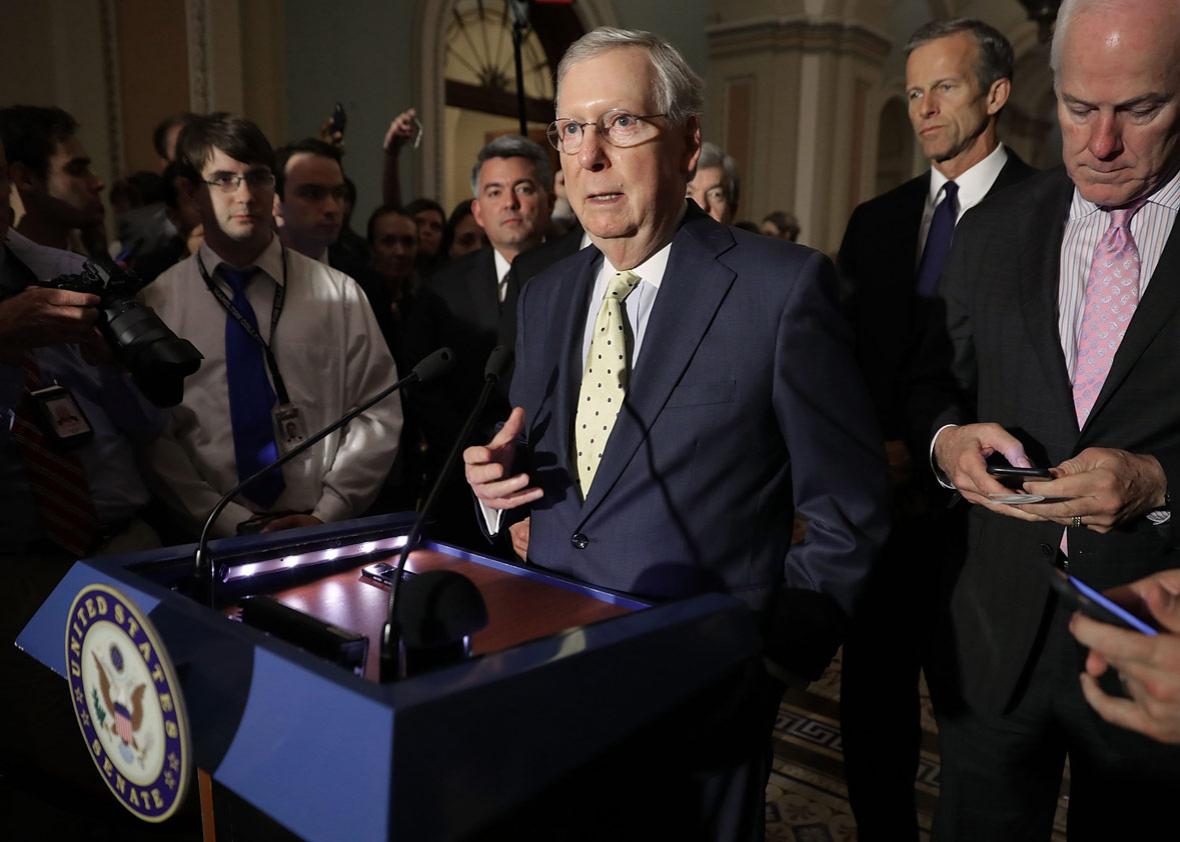This afternoon, as Senate Majority Whip John Cornyn was leaving the Republicans’ health care working group meeting, I asked him if any aspect of the still under-wraps bill had been finalized.
“None of it’s done until it’s all done,” he said. “There’s a lot of moving parts, and that’s been one of the challenges dealing with [the Congressional Budget Office], because it is interactive in its effect.”
When asked whether leaders were still hoping for a vote next week, he said, “That suits me.” And what, another reporter asked him, is the hardest issue to resolve?
“It’s all hard,” he said, and walked into his office.
Senate leaders expect to release what Senate Majority Leader Mitch McConnell is calling a “discussion draft” of their health care bill on Thursday and then vote on it once a CBO score comes in. As I wrote last week, the CBO has seen chunks of it and can score the bill rapidly once those final “inputs”—aka major health policy decisions—are made.
Calling it a “discussion draft” is quite a sleight of hand given the timeline McConnell has in mind. This is a bill to remake one-sixth of the economy that has been negotiated in private for about one-and-a-half months and is being given a perfunctory glimpse of sunlight before, if McConnell gets his way, it’s rammed through the chamber next week. The process is now lingering in a strange proto-existence: The procedural timeline is playing out for all to see, but major policy decisions, according to individual senators I spoke with Tuesday, haven’t even been made. The vote is getting teed up for late next week. Maybe they’ll even have a bill ready in time for it.
The Medicaid portion of the bill is a fine example of motion in lieu of consensus. The Hill first reported yesterday, and I heard likewise, that Senate leaders had transmitted the Medicaid portion to the CBO. The numbers they sent looked like a catastrophic loss for Republican moderates: a three-year phaseout of the Affordable Care Act’s Medicaid expansion (as opposed to the five or seven that moderates were looking for), as well as a lower growth rate on spending than what the “mean” House bill had set—in other words, much deeper long-term Medicaid cuts.
But few senators on Tuesday seemed to think that this was the Medicaid “deal.” West Virginia Sen. Shelley Moore Capito, one of the stauncher doves on Medicaid within the caucus, trashed the idea in an interview with Axios, as did Ohio Sen. Rob Portman. “We’re working on it,” Portman said, when asked if he could vote for a bill with such a proposal. When I asked Capito the same question, she looked exasperated and wouldn’t comment. “I just need a break,” she said. There were many, many reporters on Capitol Hill Tuesday morning.
“The conversation continues,” Louisiana Sen. Bill Cassidy said after leaving the working group lunch. “I think some of the decisions have been ‘made,’ if you will, but there’s still a ton of discussion going. So theoretically, they could be changed.”
In other words, McConnell may have jotted down some numbers to send to CBO. That doesn’t mean either side of any particular argument has given up on making its case or that those numbers are expected to be final. McConnell might also be committing some language to paper regarding which ACA regulations states would be allowed to waive and schlepping that paper to the CBO. That doesn’t mean that the debate has been resolved.
One thing that’s been cool about this no-one-knowing-anything phase is that Texas Sen. Ted Cruz has been able to perfect his routine with reporters when he leaves working group meetings. His answer to the first question, regardless of what it is, is always some variation of “It was a positive, productive conversation.” His answer to the second question, regardless of what it is, is always some variation of “The most important issue is how we lower premiums to make health insurance more affordable for families who are struggling.”
He performed this well Tuesday. And though a little more detail would always be nice, Cruz is signaling that his main priority in these negotiations is toward further deregulation than moderates or the rank and file might be comfortable with. Indeed, he told me that there is still “significant disagreement” over the question of which regulations states would be permitted to jettison. “But I hope we are coming towards common ground.”
The “draft” that is released Thursday, in other words, may include what amount to several placeholders while each side is still battling out its position on a number of key issues. McConnell would be on firmer ground in calling this a “discussion draft” if it really was the beginning of a process that would go on for months, with public reaction and consensus building, and all of those other delightful things accordant with a sane procedure. Instead, the bill will come out, the arguments will last for a few days, and McConnell will probably just plop whatever product remains on the Senate floor and tell his group that they’re either for this or they’re for Obamacare. The conversation continues—until Mitch McConnell forces everyone to vote.
